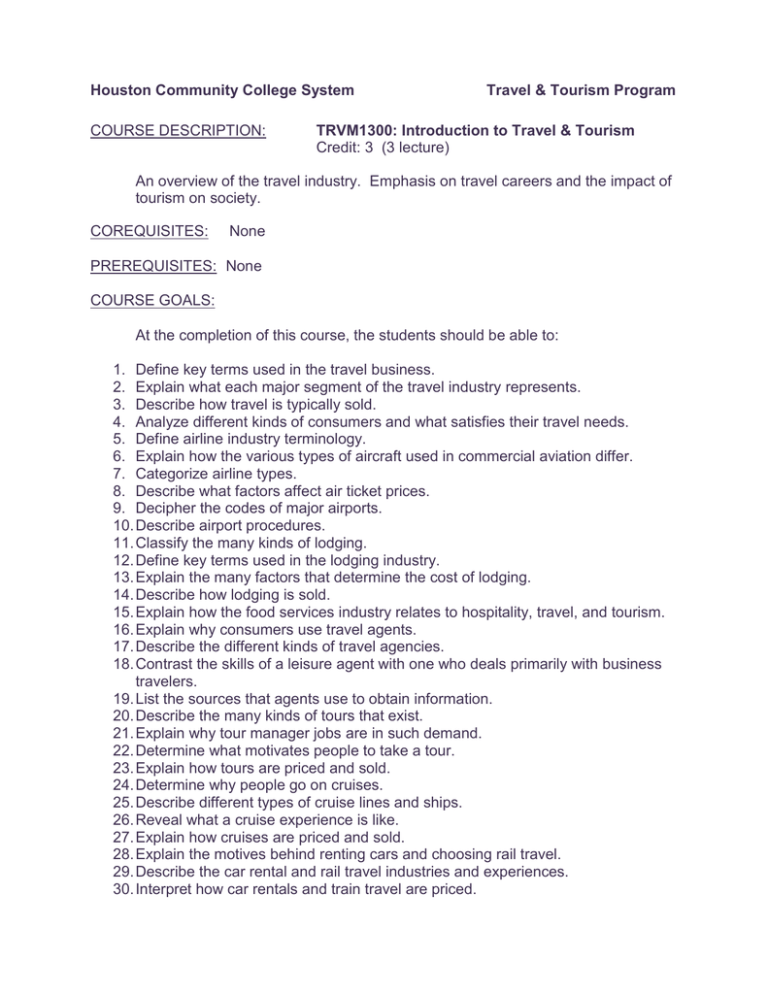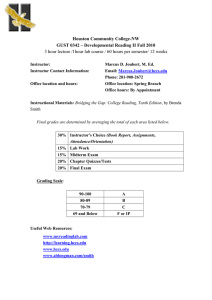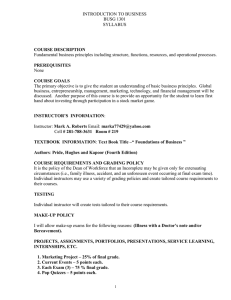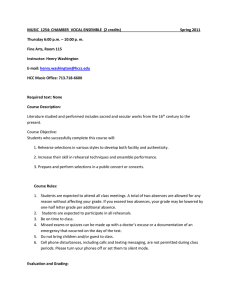1300 Introduction New.doc
advertisement

Houston Community College System COURSE DESCRIPTION: Travel & Tourism Program TRVM1300: Introduction to Travel & Tourism Credit: 3 (3 lecture) An overview of the travel industry. Emphasis on travel careers and the impact of tourism on society. COREQUISITES: None PREREQUISITES: None COURSE GOALS: At the completion of this course, the students should be able to: 1. Define key terms used in the travel business. 2. Explain what each major segment of the travel industry represents. 3. Describe how travel is typically sold. 4. Analyze different kinds of consumers and what satisfies their travel needs. 5. Define airline industry terminology. 6. Explain how the various types of aircraft used in commercial aviation differ. 7. Categorize airline types. 8. Describe what factors affect air ticket prices. 9. Decipher the codes of major airports. 10. Describe airport procedures. 11. Classify the many kinds of lodging. 12. Define key terms used in the lodging industry. 13. Explain the many factors that determine the cost of lodging. 14. Describe how lodging is sold. 15. Explain how the food services industry relates to hospitality, travel, and tourism. 16. Explain why consumers use travel agents. 17. Describe the different kinds of travel agencies. 18. Contrast the skills of a leisure agent with one who deals primarily with business travelers. 19. List the sources that agents use to obtain information. 20. Describe the many kinds of tours that exist. 21. Explain why tour manager jobs are in such demand. 22. Determine what motivates people to take a tour. 23. Explain how tours are priced and sold. 24. Determine why people go on cruises. 25. Describe different types of cruise lines and ships. 26. Reveal what a cruise experience is like. 27. Explain how cruises are priced and sold. 28. Explain the motives behind renting cars and choosing rail travel. 29. Describe the car rental and rail travel industries and experiences. 30. Interpret how car rentals and train travel are priced. 31. Identify the many types of destination marketing organizations and what they typically do. 32. Describe how other suppliers fit into the travel industry “landscape.” 33. Relate geographic principles to travel concerns. 34. Define major geographic and destination–related terms. 35. Locate the world’s significant tourist destinations. 36. Identify where some of the world’s great attractions are. 37. Explain the different types of marketing and the six steps that the marketing cycle usually requires. 38. Distinguish between transactional and consultative selling, and apply the steps that each entails. 39. Describe how service is separate from, and overlaps, sales. 40. Practice the seven steps necessary to achieve service excellence. 41. Identify what CRS and GDS systems do and how these tools support the travel industry. 42. Explain how the Internet has changed the way people buy travel 43. Describe how social media have affected the relationship between customer and supplier. 44. Clarify the many applications CRM programs have in the travel business. 45. Explain the procedures and documents associated with border crossings. 46. Interpret and apply the basic principles of currencies and exchange rates. 47. Address customer health and safety concerns. 48. Prepare for the changes in travel to come. INSTRUCTOR: Shouping Liu (713)718-6072 office Email: shouping.liu@hccs.edu (832)668-6828 cell TEXTBOOK INFORMATION: ACCESS: Introduction to Travel & Tourism 2nd Edition by Dr. Marc Mancini Published by Thomson Delmar Learning 2013(1-133-68703-2) LAB REQUIREMENTS: None STUDENT WITH DISABILITIES: Students who require reasonable accommodations for disabilities are encouraged to report to call (713)718-6164 to make necessary arrangement. Faculty are only authorized to provide accommodations requested by the Disability Support Services Office. ACADEMIC HONESTY: Students are responsible for conducting themselves with honor and integrity in fulfilling course requirement. NOTICE: Students who repeat a course for a third or more times may soon face significant tuition/fee increases at HCC and other Texas public colleges and universities. Please ask your instructor/counselor about opportunities for tutoring/other assistance prior to considering course withdrawal or if you are not receiving passing grades. ATTENDANCE AND WITHDRAWAL POLICY: 1. Attendance: A. Students are expected to attend all classes (see college catalog for attendance policy). B. Students are responsible for all work missed during an absence, and it is the student's responsibility to consult with instructors for make-up assignments. C. If a student misses 2 or more consecutive classes(12.5%, including lecture and laboratory time), he/she may be withdrawn from the course by the instructor. This policy will be strictly enforced for veterans. D. Students are expected to be quiet and attentive during the class, no pager or cellular phone is allowed during the class. 1. Withdrawal: It is the responsibility of the student to officially drop or withdraw from a course. Failure to officially withdraw may result in the student receiving a grade of “F” in the course. A student may officially withdraw in any of the following ways: A: B. Complete an official withdrawal form at the campus he or she is attending or any other HCCS campus. Send a letter requesting withdrawal to: Registrar Houston Community College Systems P. O. Box 667517 Houston, TX 77266-7517 COURSE REQUIREMENTS AND GRADING POLICY: A. Tests-student’s performance will be evaluated through true/false, fill in the blank, and multiple choice questions. To evaluate the student achievement for the stated objectives he/she will complete two tests and a comprehensive final exam. A term project(Dream Trip) with minimum of 7 pages is due on the last day of class. A current Travel/Tourism news report/article is to be presented at the beginning of each class period, and a total of ten news article is due on the last day of class. A. Grade: A = 90 – 100 B = 80 -- 89 C = 70 -- 79 D = 60 – 69 F = 59 or below A. Final Evaluation Criteria: Weekly Homework Assignment Weekly news/article Midterm exam Final Exam Term Project-Dream Trip 20% 20% 20% 20% 20% TESTING: Midterm Exam: Chapters 1 – 6 Final Exam: Chapters 7 - 12 MAKE-UP POLICY: Only under special circumstances which student could not control and with the instructor's approval make-up exam will be given. PROJECTS, ASSIGNMENTS, PROTFOLIOS, SERVICE LEARNING, INTERNSHIPS, ETC.: Dream Trip COURSE CONTENT, COURSE CALENDAR WITH READING ASSIGNMENTS: Weeks Date/Homework Assignment Homework Assignment Pages (due by following Monday before class starts) Week 1: 08/24/2015 Introduction & course syllabi Week 2: 08/31/2015 Chapter 1 none pages 21-24 & 1 current news Week 3: 09/07/2015 Labor Day holiday none Week 4: 09/14/2015 Chapter 2 pages 47-50 & 1 current news Week 5: 09/21/2015 Chapter 3 pages 70-72 & 1 current news Week 6: 09/28/2015 Chapter 4 pages 98-100 & 1 current news Week 7: 10/05/2015 Chapter 5 pages 119-122 & 1 current news Week 8: 10/12/2015 Chapter 6 pages 140-142 & 1 current news Week 9: 10/19/2015 Mid-term Exam (chapters 1 - 6) Week 10: 10/26/2015 Chapter 7 pages 166-168 & 1 current news Week 11: 11/02/2015 Chapter 8 pages 192-194 & 1 current news Week 12: 11/09/2015 Chapter 9 pages 220-222 & 1 current news Week 13: 11/16/2015 Chapter 10 pages 246-248 & 1 current news Week 14: 11/23/2015 Chapters 11+12 pages 265-267 & 1 current news pages 286-288 & 1 current news Week 15: 11/30/2015 Final Exam (chapters 7 - 12) *all news articles due in a folder Week 16: 12/07/2015 Dream Trip Project presentation *Last day for administrative/student withdrawals – October 30, 2015 by 4:30pm HCC is committed to provide a learning and working environment that is free from discrimination on the basis of sex which includes all forms of sexual misconduct. Title IX of the Education Amendments of 1972 requires that when a complaint is filed, a prompt and thorough investigation is initiated. Complaints may be filed with the HCC Title IX Coordinator available at 713 718-8271 or email at oie@hccs.edu.





